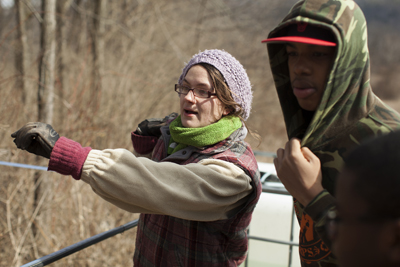Wood’s Earth digs deep to bring local foods to schools
By Susan Kelley

Ithaca-area children soon will be eating organic greens, winter squash and green beans grown just a few miles away in their school lunches.
Fresh, local food is making its way into area school lunch programs with the help of Wood’s Earth Living Classroom, which cultivates community involvement in growing and sourcing school food.
“People are not aware that there is barely any local food getting into our schools, but we can work together as a community to solve that and be creative with our land use,” said Audrey Baker ’09, program director of Wood’s Earth, a new project of the Center for Transformative Action (CTA).
“Wood’s Earth is having a positive impact in helping source fresh, local produce in the Ithaca area public schools,” added Anke Wessels, executive director of CTA, a Cornell-affiliated social entrepreneurship and action nonprofit. “The Wood’s Earth model is particularly attractive because it is creating change at the personal, institutional and systems levels.”
A collaborative approach and a 2.5-acre field in Ithaca, with a drip irrigation system and a black-locust deer fence, are at the heart of Wood’s Earth’s four programs. The land is on the 145-acre Steep Hollow Farm, which has been in the same family for four generations and has produced horses and tobacco.
Baker and operations manager Lance Ebel use half the field to grow fresh produce that they sell to school food programs. They rent the other half to community gardeners and provide tools, compost and “how-to” gardening workshops. Topics range from scything to plant disease identification and yoga for gardeners. In April, with a community gardener, they’ll teach a mushroom inoculation workshop.
The garden also serves as a “living classroom,” where kids and adults learn how to garden. For example, the Greater Ithaca Activity Center’s Conservation Corps – teens learning job skills in community organizations – has learned how and why to mulch the field and is learning design and construction concepts while building a shed for the site.
Meanwhile, Baker is building logistical and communications networks among farmers, distributors, school food programs and several nonprofits, so that the schools can get the food they need at a price they can afford. Baker works closely with the Ithaca City School District’s Child Nutrition Program, which serves lunch daily to about half of the district’s 5,000 students, and the Cool School Food Program of the New York Coalition for Healthy School Food, which brings plant-based entrées to schools.
By the end of this summer, Baker hopes to double the community garden space to 50 gardeners from 25 in 2012 and talk with town of Ithaca officials about property tax incentives for farmers who are transitioning their farms to organic.
“We need to get more connected to our food,” said Baker, a Cornell Institute for Public Affairs graduate student studying institutional food program reform. “Being connected to our food and where it comes from builds some understanding of our relationship with the land that leads to environmental stewardship, which can carry out into all sectors of life. If we focus on kids, that will pop up in the next generation.”
Media Contact
Get Cornell news delivered right to your inbox.
Subscribe